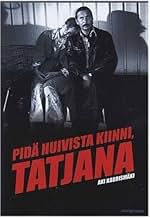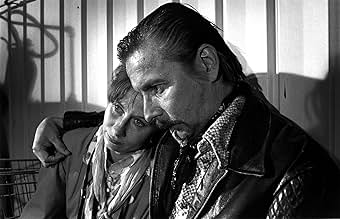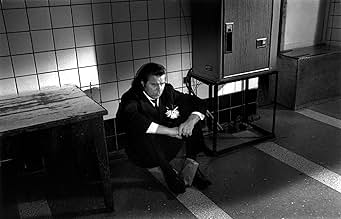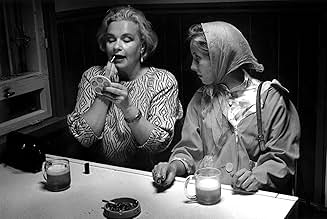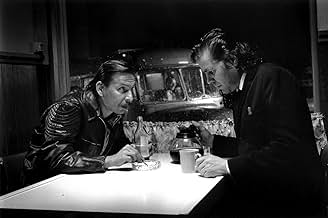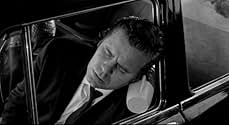IMDb RATING
7.1/10
4.1K
YOUR RATING
Lugubrious Finns Valto and Reino take to the road in search of coffee and vodka, but are interrupted by the Russian Klaudia and Estonian Tatiana, clearly interested in them. Are there chance... Read allLugubrious Finns Valto and Reino take to the road in search of coffee and vodka, but are interrupted by the Russian Klaudia and Estonian Tatiana, clearly interested in them. Are there chances of getting a response though language barrier?Lugubrious Finns Valto and Reino take to the road in search of coffee and vodka, but are interrupted by the Russian Klaudia and Estonian Tatiana, clearly interested in them. Are there chances of getting a response though language barrier?
- Director
- Writers
- Stars
- Awards
- 2 wins & 2 nominations total
- Director
- Writers
- All cast & crew
- Production, box office & more at IMDbPro
Featured reviews
10mingus_x
i really love this movie. it has so many unique and wonderful characters. every one celebrates his individuality. so many bizzare gadgets: a built in vinyl record player for cars, a coffee machine also in the car to ease one of the main characters need for the black drink (when there is no vodka around). a finnish road movie. slow pace, but lovely mood and the will to survive through the darkest night. very recommended. enjoy your life as long as you can and try to watch this movie before it ends ...
10nh-2
After seeing this movie I wondered how foreigners would experience it. Without knowledge of the social history of Finland in last century this movie must seem very strange. And if you know nothing about our civil war and the division of society these characters are devoid of meaning. Just two avoidant personalities, maybe? However from a Finnish perspective this is the perfect description of the outsiders of our society. The fellows who are left behind, but don´t agree with that viewpoint themselves. Who are stranded in the no-man´s-land between urban success and country desolation. They try to get along somehow and when they meet two Russian girls it´s the irony of fate staring them in the eye. The Russians are able to surpass social barriers without flinching, they just go on and talk, but these two Fenno-ugrian oedipal conflict prototypes can´t seem to find some meaning in this. Instead they resort to sulking, one of the basic Finnish social coping skills. What else can you do when you´ve got nothing in an otherwise expansive society, when there´s this huge discrepancy between your own success expectancies and reality, and when you watch the grandchildren of the victorious side in the Civil War pass you by. Not much, according to Kaurismäki who manages to make movies about that part of Finland that never goes to movies. For a Finn, the music is lovely as usual, the kind of music we grew up to after the war.
Even though there tend to be some incredibly funny scenes in his films, Finnish director Aki Kaurismäki has only done three proper comedies in his career thus far: the hilarious Leningrad Cowboys Go America, the less inspired, but still watchable sequel Leningrad Cowboys Meet Moses and Take Care of Your Scarf, Tatjana. It is the last of these that stands out as the funniest (read: best), largely because it doesn't try to be openly amusing most of the time.
At first it looks like a road movie, since we've got two average Finnish blokes going on a trip together: one of them, the coffee-addicted Valto (Mato Valtonen), is trying to escape from his boring daily routine (he lives with his mother, whom he locks up in a closet at the beginning of the movie); his pal, Reino (Matti Pellonpää), a mechanic with a soft spot for Koskenkorva (the Finns' favorite booze), comes along just for the fun. The two don't do much aside from driving and drinking, that is until they run into Klavdia (Kirsi Tykkyläinen) and Tatjana (Kati Outinen), two women from the former Soviet Union who ask if they can join the odd couple.
This is where the film really comes to life, as Kaurismäki sets to emphasize, and thus subsequently erase, the difference between two cultures: Klavdia and Tatjana enjoy chatting and dancing, whereas Reino and Valto prefer to shut up and keep drinking (the longest either of them ever speaks is when the former brags about breaking some guy's teeth). And yet their silence says more than all the dialogue Kaurismäki has ever written (which, Bohemian Life notwithstanding, isn't that much), and through that non-communication something deeper starts to take shape between the otherwise rude Reino and the sweet Tatjana, leading to a beautiful shot (also used as the film's poster) where the two of them are shown sitting together on a bench. This stunning image (which is quite similar to a shot in Sofia Coppola's Lost in Translation), relying solely on the actors' faces and (minimal) gestures, not words, is one of the most touching the Finnish master has ever filmed, and invites obvious comparisons with Shadows in Paradise, also featuring Outinen and Pellonpää. The latter, in particular, gave his best performances on those occasions, being to Kaurismäki what Robert De Niro used to be to Martin Scorsese, and his premature death at age 41, which occurred a year after this film was completed, adds an extra emotional punch to the movie, especially the aforementioned scene and the oddly (for the director, that is) optimistic, heartfelt epilogue.
Kaurismäki's films are, admittedly, a bit of an acquired taste, something not everyone might enjoy (I wasn't actually that big a fan either at first, before I understood how captivating his works can be), though Take Care of Your Scarf, Tatjana, is the kind of movie non-fans could give a try, its magic lying in the director's trademark minimalistic approach: things are kept real and simple, meaning that the movie may be very short (59 minutes), yes, but also that every single one of those minutes is unmissable.
At first it looks like a road movie, since we've got two average Finnish blokes going on a trip together: one of them, the coffee-addicted Valto (Mato Valtonen), is trying to escape from his boring daily routine (he lives with his mother, whom he locks up in a closet at the beginning of the movie); his pal, Reino (Matti Pellonpää), a mechanic with a soft spot for Koskenkorva (the Finns' favorite booze), comes along just for the fun. The two don't do much aside from driving and drinking, that is until they run into Klavdia (Kirsi Tykkyläinen) and Tatjana (Kati Outinen), two women from the former Soviet Union who ask if they can join the odd couple.
This is where the film really comes to life, as Kaurismäki sets to emphasize, and thus subsequently erase, the difference between two cultures: Klavdia and Tatjana enjoy chatting and dancing, whereas Reino and Valto prefer to shut up and keep drinking (the longest either of them ever speaks is when the former brags about breaking some guy's teeth). And yet their silence says more than all the dialogue Kaurismäki has ever written (which, Bohemian Life notwithstanding, isn't that much), and through that non-communication something deeper starts to take shape between the otherwise rude Reino and the sweet Tatjana, leading to a beautiful shot (also used as the film's poster) where the two of them are shown sitting together on a bench. This stunning image (which is quite similar to a shot in Sofia Coppola's Lost in Translation), relying solely on the actors' faces and (minimal) gestures, not words, is one of the most touching the Finnish master has ever filmed, and invites obvious comparisons with Shadows in Paradise, also featuring Outinen and Pellonpää. The latter, in particular, gave his best performances on those occasions, being to Kaurismäki what Robert De Niro used to be to Martin Scorsese, and his premature death at age 41, which occurred a year after this film was completed, adds an extra emotional punch to the movie, especially the aforementioned scene and the oddly (for the director, that is) optimistic, heartfelt epilogue.
Kaurismäki's films are, admittedly, a bit of an acquired taste, something not everyone might enjoy (I wasn't actually that big a fan either at first, before I understood how captivating his works can be), though Take Care of Your Scarf, Tatjana, is the kind of movie non-fans could give a try, its magic lying in the director's trademark minimalistic approach: things are kept real and simple, meaning that the movie may be very short (59 minutes), yes, but also that every single one of those minutes is unmissable.
The Finnish infant terrible returns to the monochromatic rock'n'roll vibes of his earlier CALAMARI UNION, only this time he substitutes the avant-garde surrealism with the silent, deadpan minimalism he meticulously cultivated for most of his career. Two thirty-something rockers working menial jobs and leading dead-end lives embark on an impromptu journey in their cool car, along with a coffee-car mixer and a portable record player. Along the way they meet two Russian women who are looking for a lift.
TATJANA is part road movie, part romance, both done in Kaurismaki's distinct, ever so enjoyable and relaxed, quiet way. The black and white cinematography is absolutely fantastic, the soundtrack as usually an eclectic mix of rock'n'roll, jazz and folk and the mood of the same deadpan unaffection that permeates the rest of his work. His characters cold and detached on the outside, yet they miraculously emote better than the best overacting could afford you.
Clocking at only 59 minutes, TATJANA doesn't so much feel as a fully-fledged movie as a broad stroke. Seen independent it's one thing; seen as part of Kaurismaki's broader universe, like another vignette of gloomy but not miserable Finnish life, it takes its proper place. See it in a double-bill with CALAMARI UNION or ARIEL.
TATJANA is part road movie, part romance, both done in Kaurismaki's distinct, ever so enjoyable and relaxed, quiet way. The black and white cinematography is absolutely fantastic, the soundtrack as usually an eclectic mix of rock'n'roll, jazz and folk and the mood of the same deadpan unaffection that permeates the rest of his work. His characters cold and detached on the outside, yet they miraculously emote better than the best overacting could afford you.
Clocking at only 59 minutes, TATJANA doesn't so much feel as a fully-fledged movie as a broad stroke. Seen independent it's one thing; seen as part of Kaurismaki's broader universe, like another vignette of gloomy but not miserable Finnish life, it takes its proper place. See it in a double-bill with CALAMARI UNION or ARIEL.
Although Finnish film 'Take Care of Your Scarf, Tatiana' is a short film but the manner in which it has been directed by Aki Kaurismaki, it can be stated that it beats many a feature film both in content as well as style. This has a lot to do with its exclusive focus on some unusual male-female relationships which have been shown to be successful even in the absence of a common idiom. Alcohol and Coffee play an important role in Aki Kaurismaki's films and this film is a perfect example of the extent to which people would go in order to get hold of these beverages. For a road movie shot in black and white, this Aki Kaurismaki film has challenging roles for Finnish actors Matti Pellonpää and Kati Outinen. It is with utmost sincerity that they demonstrate that language is not a barrier for two people to communicate their feelings as gestures can also be used to express feelings of mutual appreciation.
Did you know
- TriviaMost of the time when Matti Pellonpää drinks vodka in the film it is the real thing according to director Aki Kaurismäki.
- ConnectionsEdited from Topralli (1966)
- SoundtracksIf I Had Someone To Dream Of
Written and Arranged by Lindskog and Feichtinger
Performed by The Renegades
- How long is Take Care of Your Scarf, Tatiana?Powered by Alexa
Details
- Release date
- Countries of origin
- Languages
- Also known as
- Take Care of Your Scarf, Tatiana
- Filming locations
- Production companies
- See more company credits at IMDbPro
- Runtime1 hour 2 minutes
- Color
- Sound mix
- Aspect ratio
- 1.85 : 1
Contribute to this page
Suggest an edit or add missing content

Top Gap
By what name was Tiens ton foulard, Tatiana (1994) officially released in India in English?
Answer
